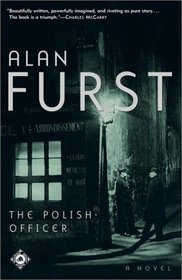Helpful Score: 4
I've never read any of Furst's books before, and I'm not hugely familiar with the spy genre, but I enjoyed this. We follow the hero, Captain Alexander de Milja, from besieged Warsaw in 1939, to France as she capitulates in 1940, to Ukraine and a small desperate band of partisans battling both the Germans and the Soviets in the winter of 1941.
De Milja is an appealing character, a man who has accepted the fact that he will die at some point, but who doggedly works at every task his superiors set for him. He encounters many varied men and women, both enemies and friends, with each new identity he assumes. These secondary characters are all vividly drawn, often in very few words--the author has a gift for characterization.
The book doesn't really build to a climax; we simply move along with de Milja through two years of war and leave him as he gathers his resources and decides where to go next. The details of Europe at war and the character of de Milja are what kept me turning pages...the story itself is a little flat.
De Milja is an appealing character, a man who has accepted the fact that he will die at some point, but who doggedly works at every task his superiors set for him. He encounters many varied men and women, both enemies and friends, with each new identity he assumes. These secondary characters are all vividly drawn, often in very few words--the author has a gift for characterization.
The book doesn't really build to a climax; we simply move along with de Milja through two years of war and leave him as he gathers his resources and decides where to go next. The details of Europe at war and the character of de Milja are what kept me turning pages...the story itself is a little flat.
Helpful Score: 1
Another brooding, dark WWII story by Alan Furst. You feel like you are there in Europe watching the whole story develope.
This wasn't the first book Alan Furst wrote, but it was the first of his books I read. I read a lot of military history, and was deep into the Nazi invasion of Poland when I ran across it.
I enjoyed it so much I have collected all his books. I don't rush to read them; I ration them out and savor each when I'm in the mood for some really good writing.
He is a master at scene setting; with just a few sentences he puts you right into the scene and the time. I have been able to identify with every one of his protagonists - even the ones working for the Russians.
I have another copy of this book in a 3-novel compilation, or it wouldn't even be on my Bookshelve for claiming; I think he's become one of my favorite authors, right after John LeCarre..
I enjoyed it so much I have collected all his books. I don't rush to read them; I ration them out and savor each when I'm in the mood for some really good writing.
He is a master at scene setting; with just a few sentences he puts you right into the scene and the time. I have been able to identify with every one of his protagonists - even the ones working for the Russians.
I have another copy of this book in a 3-novel compilation, or it wouldn't even be on my Bookshelve for claiming; I think he's become one of my favorite authors, right after John LeCarre..
While I am a fan of Furst, I don't like some of his novels. The ones which feature communist protagonists are often depressing, in that you can't trust anyone or anything and you wonder if that person's life is worth living.
However, I enjoyed this one, which, unlike many of his others, ended rather abruptly. In fact, I was surprised when I finished reading one of the final chapters and turned the page expecting to find another, but it wasn't there.
And it helps if you already know what happened in the Katyn Forest.
The Polish role throughout World War II is really one of the greatest, and heart-breaking, stories of that period. For example, while many know the Allies' use of the Enigma code shortened the war by many years, few know it was the Poles who reversed-engineered the Enigma machine in 1932. Upon the fall of Poland in 1939, they flew the machine and associated experts to France, who later made it to England when France fell.
I also suggest you read "A Question of Honor" by Lynne Olson and Stanley Cloud. Afterwards, you may have a different view of American and British political leaders of that time.
However, I enjoyed this one, which, unlike many of his others, ended rather abruptly. In fact, I was surprised when I finished reading one of the final chapters and turned the page expecting to find another, but it wasn't there.
And it helps if you already know what happened in the Katyn Forest.
The Polish role throughout World War II is really one of the greatest, and heart-breaking, stories of that period. For example, while many know the Allies' use of the Enigma code shortened the war by many years, few know it was the Poles who reversed-engineered the Enigma machine in 1932. Upon the fall of Poland in 1939, they flew the machine and associated experts to France, who later made it to England when France fell.
I also suggest you read "A Question of Honor" by Lynne Olson and Stanley Cloud. Afterwards, you may have a different view of American and British political leaders of that time.
Mr. Furst knows Europe and history-- a writer who achieves unity, emphasis, mood, and coherence.
After the fall of Poland in 1939, the military officer is recruited by the Polish underground to save Poland's national treasure. Another of Furst's sleek atmospheric novels.




